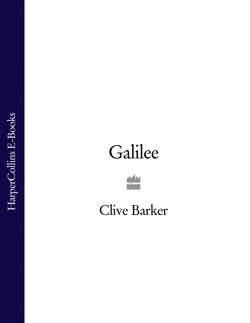Читать книгу Galilee - Clive Barker, Clive Barker - Страница 8
III i
ОглавлениеShe knew better of course. I’ve lived, damn her! Before my injury I had almost as great an appetite for experience as Nicodemus. I take that back. I was never as interested in the sexual opportunities afforded by my travel as he was. He knew all the great bordellos of Europe intimately; I preferred to wander the cathedrals or drink myself into a stupor in a bar. Drink is a weakness of mine, no question, and it’s got me into trouble more than once. It’s made me fat too. It’s hard, of course, to stay thin when you’re in a wheelchair. Your backside gets big, your waistline spreads; and Lord, my face, which used to be so well made I could walk into any gathering and take my pick of the female company, is now pasty and round. Only in my eyes might you glimpse the magnetism I once exercised. They are a peculiar color: mingled flecks of blue and gray. The rest of me’s just gone to hell.
I suppose that happens to everybody sooner or later. Even Marietta, who is a pure-blooded Barbarossa, has said that over the years she’s noticed some subtle signs of aging; it’s just much, much slower than it would be for a human being. One gray hair every decade or so isn’t anything to bitch about, I remind her, especially when nature had given her so much else: she has Cesaria’s flawless skin (though neither she nor Zabrina are quite as black as their mother) and Nicodemus’s physical ease. She also shares my delight in getting drunk, but as yet it’s taken no toll on her waist or her buttocks. I digress; again. How did I get onto the subject of Marietta’s backside? Oh yes, I was talking about how I traveled as my father’s envoy. It was wonderful. I stood in the shit in a lot of stables over the years, of course, but I also visited some of this planet’s glories: the wilds of Mongolia, the deserts of North Africa, the plains of Andalusia. So please understand that though I’m now reduced to being a voyeur, this wasn’t always the case. I don’t write as a theorist, pontificating on the state of a world that I only knew from my newspapers and my television screen.
As I get deeper into the story I’ll no doubt season it with talk of the sights I saw and the people I knew on my journeys. For now, let me just talk of England, the country where I was conceived. My birth mother was a woman by the name of Moira Feeney, and, though she died a short time after my birth, of a sickness I’ve never quite comprehended, I passed the first seven years of my life in her native country, looked after by her sister, Gisela. It was not by any means a cosseted existence; Gisela was enraged when she discovered the father of her sister’s child did not intend to bring us into his charmed circle, and rather than accept the substantial sums he offered her to help raise me, she proudly, and foolishly, refused all subsidy. She also refused to see him. It wasn’t until Gisela also died (she was struck, somewhat suspiciously, by lightning) that my father appeared in my life, and took me with him on his travels. In the next five years we lived in a number of extraordinary houses, the guests of great men who wanted my father’s advice as a horse breeder (and Lord knows what else besides; I think he was probably shaping the destinies of nations behind the scenes). But for all the glamour of those years—two summers in Granada, a spring in Venice; so much more that I can’t recall—it is my years in Blackheath with Gisela that I still return to most fondly. Gende seasons these; and my gentle human aunt, and milk and rain and the plum tree at the back of the cottage, from the topmost branches of which I could see the dome of St. Paul’s.
I have a pristine memory of what it was like to perch in those gnarled branches, where I would linger for hour upon hour, lulled into a happy trance by rhymes and songs. One of those rhymes I remember to this day.
It seems I am,
It seems I was,
It seems I will
Be born, because
It seems I am,
It seems I was,
It seems I will
Be born because—
And so on, round and round.
Marietta’s right, I do miss England, and I do what I can to keep remembrance of it. English gin, English syntax, English melancholy. But the England I yearn for, the England I dream of when I doze in my chair, no longer exists. It was just a view from a plum tree, and a happy child. Both went into history a long time ago. It is, however, the second reason why I am writing this book. In opening the floodgates of memory, I hope to be carried, at least for a little while, back into the bliss of my childhood.
